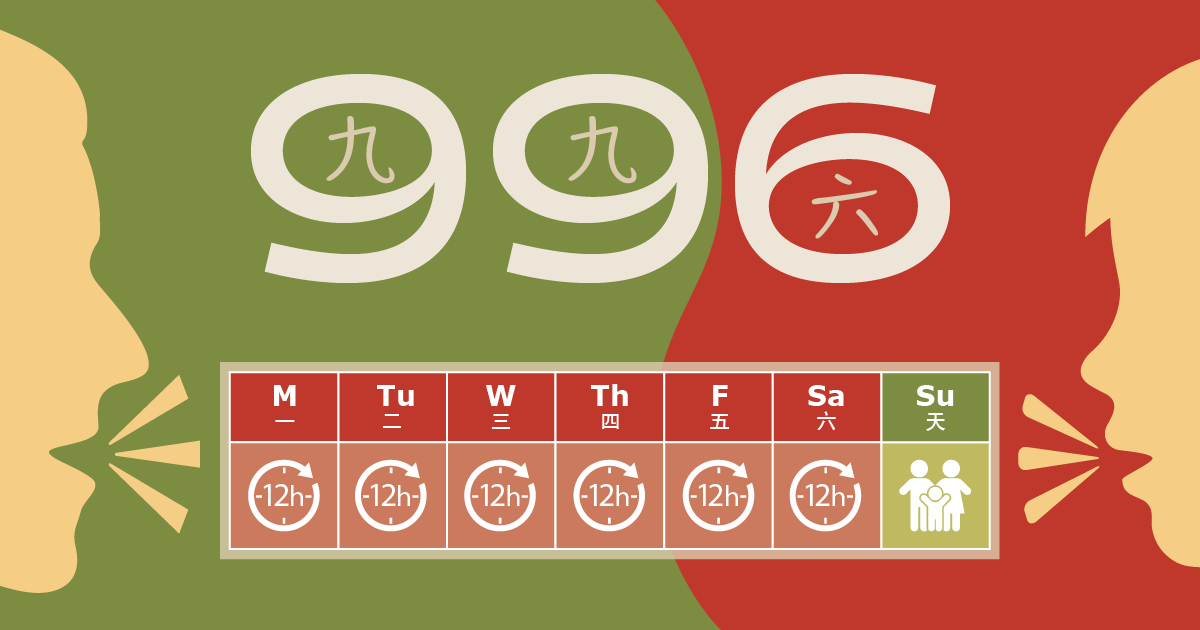Modern-day Chinese work culture is focusing on a strict hierarchical structure and long work hours. Clocking on an average 48.7 hours of work a week in 2023, Chinese employees are often compelled to make sacrifices for their employers. The IT sector in China is particularly infamous for its long work hours and lack of holidays. But as the Chinese population gains access to better living standards, younger generations are increasingly rejecting the concept of living solely for work.
What to know about the Chinese work culture
China’s 996 work culture
996 is a term to describe working shifts that would start from 9 am to 9 pm, 6 days a week totaling a whooping 72 hours per week. The origin of this particular work culture dates back to the 1970’s with China’s economic policies and opening to the West. In order to develop the Chinese economy and lift the country out of poverty, working overtime became a norm. It was considered crucial to work around the clock to gain a “first-mover” advantage over competitors.
The 996-work culture has also contributed to keeping China’s wages relatively low, despite experiencing a slow but steady increase in recent years. This practice has helped maintain China’s competitive advantage over Western economies. The 996 working system is not a formal policy in a company, rather it is an unwritten but important rule. Even if there is no actual work or tasks, employees would stay longer to show dedication and commitment. Hence, peer pressure is a major factor for such working hours.

China’s 996 work culture is mostly predominant in the tech industry
The 996-work culture is most prevalent in large corporations (such as Alibaba, Tencent, Huawei or JD.com). During the technological start-up boom of the 2000s, companies like Tencent and Alibaba arose. 20 years later, they were among China’s most prosperous businesses. Their success may have been the result of a relentless work ethic. Companies were unable to acquire employees at the same rate as the company’s growth; as a result, employees had to work longer hours, beginning with one day of overtime per week and progressing to every day. The result was the current 996 work culture.
Other variants to the 996-work culture exist
There are other variants to the 996-work culture such as 8106 (from 8am to 10pm, 6 days per week), 997 (from 9am to 9pm, 7 days per week). However, the 007 work culture is the most striking. Under this work culture, an employee would have to work from 0am to 0pm 7 days per week, in other words, 24 hours a day, which means he or she would have to be available online all day. With the development of the internet and technology, it has been easier to work out of the office. Consequently, work cultures such as 996 and 007 have appeared. It is important to note that not all Chinese employees work under such hectic schedules. Service companies such as newspapers tend to follow the 955 working system or have flexible working hours.
How Chinese Gen-Z are rejecting harsh work culture
The 躺平 or “lying flat” trend
Lying flat (躺平) literally means “lying down and resting”. As an internet buzzword, it means not following the unwritten rules of fast-paced society. This include not buying a house or a car, not getting married, and not having children. For some individuals, it also means not consuming and maintaining the minimum standard of survival. Ultimately, in terms of employment, it is refusing to become a money-making tool for others.
Some Chinese workers are rejecting the 996-work culture because they believe it prevents them from maintaining a proper work-life balance. Apart from commuting to work and sleeping, they are not able to do other activities as they are stuck at work and feel constantly tired and pressured. By “lying flat” they are able to show their disagreement with the 996-work culture which relies on hard work and long working hours.

松弛感(chillax) and 低配生活(low-profile life) now grab netizens’ attention
Since 2022, 松弛感 (chillax) and 低配生活(low-profile life) have drawn much attention on Chinese social media. Similar to the “lying flat” trend, they also encourage people to relax and stop working too diligently.

At first, the term “chillax” is associated with family relationships, referring to the mutual understanding among family members. As a result, people use this phrase to describe their personal feelings and life attitude, indicating a state of being relaxed, natural, and comfortable – free from tension, entanglements, and nervousness – while having the ability to find peace even when things do not go as planned. This trend has gained a lot of popularity on social media, especially Xiaohongshu. The emphasis on relaxation has led individuals to reflect on the reason behind the inability to relax and the occurrence of tension in their lives.
Embracing a “low-profile life” implies a plain existence. A low-profile life does not imply that people should reduce their quality of life, but rather learning to give up something redundant in the world that is filled with desires. People living a low-profile life do not pursue extravagance but advocate a minimalist and meaningful life, focusing on simple affairs. Nowadays, Chinese Gen-Z are increasingly devoted to the idea of a low-profile life.
Is Chinese work culture going to change any time soon?
Despite the fact that the 996 work schedule is prevalent in large companies, it is, in fact, illegal. The current labour law of the People’s Republic of China stipulates that the daily working hours of workers shall not exceed 8 hours, and the average weekly working hours shall not exceed 44 hours. 36 hours per month of overtime are allowed. However, people do not always adhere to the law. Frequently, workers do not fill in their overtime hours with the human resources department, meaning that they do not get any money for them.
The Chinese government is cracking down on overtime working
The Chinese government is now intervening to handle it. In order to investigate and address issues with overtime work and to safeguard workers’ legal rights to rest and vacation, the Beijing Municipal Bureau of Human Resources and Social Security published a centralized examination of working hours in the city in 2022. Internet enterprises have been the focus of inspection due to the prevalent issue of overtime work. If a company is found to have committed relevant illegal acts, it will be exposed, punished according to the law. It will also require to rectify its behavior within a specified time frame. Following suit, several provinces including Shandong, Guangxi, and Hunan have implemented similar measures to tackle overtime work.
The crackdown of overtime work reflects the government’s increased concern for protecting the fundamental rights of employees. According to Su Hainan, a researcher at the China Society of Labor, the implementation of 996 goes against employees’ expectations and should never become a social trend. Therefore, the message is clear based on the actions of the Chinese government: the future trend will be to rectify the culture of overtime labor, in order to protect workers and enhance their quality of life.
What are the important lessons learned about Chinese work culture?
- The work culture in China, particularly the 996 and 007 work cultures, encourage employees to put in long hours in order to distinguish themselves and achieve promotion. As part of their typical workload, employees are frequently required to work overtime and on weekends.
- The IT industry in China is infamous for its lengthy work hours. Some of the largest groups have 72-hour work weeks as part of the infamous 996 work culture.
- There is a rise in Chinese Gen Zs who oppose the 996 system who assert their right to a comfortable lifestyle. Consequently, the “lying flat” trend, a sense of relaxation, and a low standard of living are broadly accepted.
- The Chinese government is cracking down on overtime work. The future trend of Chinese work culture will be to correct the culture of overtime labor, protect workers, and enhance their quality of life.
Read our report on She economy in China






